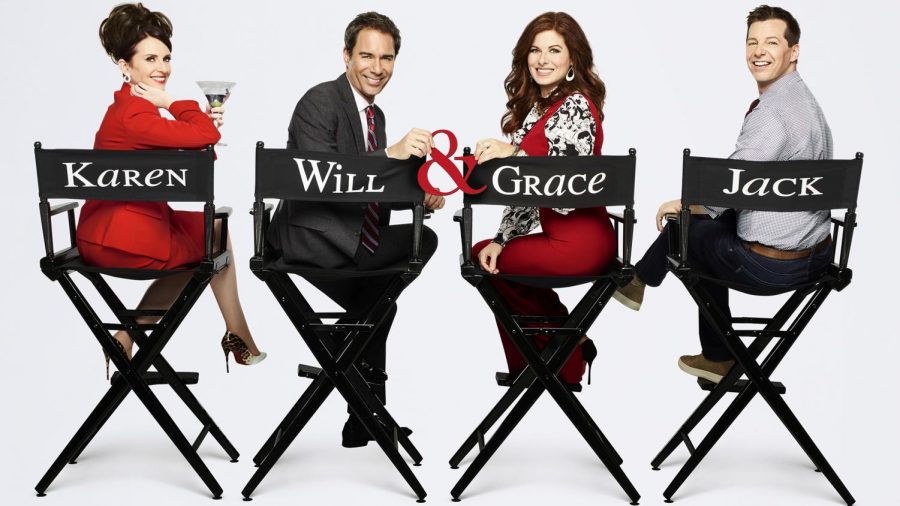Why Will and Grace Was a Revolutionary Show Then And Why It Still Is Now
October 23, 2017
By Ruth Kramer ’18, Editor-In-Chief
Will and Grace has become my newest obsession. A Thursday night sitcom surrounding the dysfunctional lives of romantically-challenged Grace and work-devoted Will? Great! Throw in a colorful set of background characters and you have a hit on your hands. But what distinguishes Will and Grace from any other sitcom is its focus on the LGBTQ+ community in the United States, specifically New York, where both Will and Grace live. In the 1990s, when the show first aired, the idea of not one, but two main characters being gay was unheard of. Sure, Carol was Ross’s lesbian ex on FRIENDS, but she was present for fewer than ten episodes. Dawson’s Creek broke down gay stereotypes for high school students, but relationships were hidden and seen as unacceptable. Will and Grace is different because it tackles this issue from a new angle: one of acceptance and normalcy. And now, after more than 10 years of being off the air, the show is back and better than ever. But, it’s also ready to tackle some new issues with the same lens it did 20 years ago.
Will and Grace first aired in 1998 on NBC and quickly drew in viewers. In it’s premiere episode, Will and Grace are seen speaking on the phone in a seemingly romantic manner until the camera pans over to Will’s empty apartment and Grace’s (at the time) boyfriend. The show quickly develops into a reunion between college best friends and follows their misadventures. Will and Grace are both equally successful in their respective careers; Will a highly regarded lawyer and Grace an impressive interior designer. Both also come with some baggage in the forms of less than ideal friends. Will’s friend, Jack, is also a gay man who acts for a living and, rightly, is most comfortable when the spotlight is on him. Grace brings her assistant Karen to the table; a married, rich woman who is more interested in painting her nails than actually helping Grace. Together these characters face the highs and the lows together: problematic family members, weekly poker games, and even Halloween horrors. In their lives the audience finds humor and delight, but also bits of reality, which is the show’s greatest strength. No, not everyone can afford an apartment like Will’s nor does everyone have enough money for a little bit of everything like Karen, but the emotion behind the characters is what makes the series truly special.
Will and Grace is revolutionary. But why? What was so special about Will’s sexuality being portrayed on-screen just like Grace’s was? The way the show was framed was to present Will and Grace as the producers of FRIENDS had presented Chandler and Monica. Two people working hard to pay their bills and hopefully finding love along the way. It’s normal, it’s life. And Will and Grace does just that. Jokes about Grace’s romantic relationships are equal to that of Will’s. Laugh tracks roll when dates go wrong for both of them. While Will’s struggles in dating may be a little different than Grace’s, the idea of his life being normal transformed how heterosexual Americans saw the homosexual community. What also added to Will and Grace’s diversity is the socioeconomic statuses of the group as well as their religious backgrounds. Karen is unbelievably wealthy due to her husband’s success, while Jack (whom Karen gets along with swimmingly) has less money as he chases his dream of being an actor or a singer. Will and Grace are both successful, but Will earns more than Grace, as he pays most, if not all, of the rent for the apartment they share. Religiously, Will doesn’t necessarily discuss his faith on the show, but Grace’s character is Jewish and the writers were unafraid of placing traditional Jewish words in her speech patterns. Even Grace’s last name, Adler, is a commonly Jewish surname. The idea of a Jewish woman being friends with a gay lawyer who is also friends with a gay actor and a rich, drunken assistant is not a common one. And 20 years ago, it was unheard of.
Now that Will and Grace has returned, it is ready to tackle more issues in modern day America. Politically, one of the four is a republican, while the other three are die-hard democrats. Grace’s new assistant is a Latino man. Senators are no longer just old, white men. These minute details are big changes from when the show aired, and hopefully there will be more to come. In today’s political landscape, Will and Grace is gearing up to make clear their views just as they did in 1998–that all people deserve the respect of being a human being and that all persons are normal. Hopefully the show will hang around long enough to see the impact as it did back then.
So, if you have got some spare time, try an episode of Will and Grace. While progressive in many ways, the show is funny. It’s emotional. And the characters all have their own quirks that make them so likeable and relatable. Will and Grace changed a nation many years ago. And they are ready, willing, and able to do it again.



